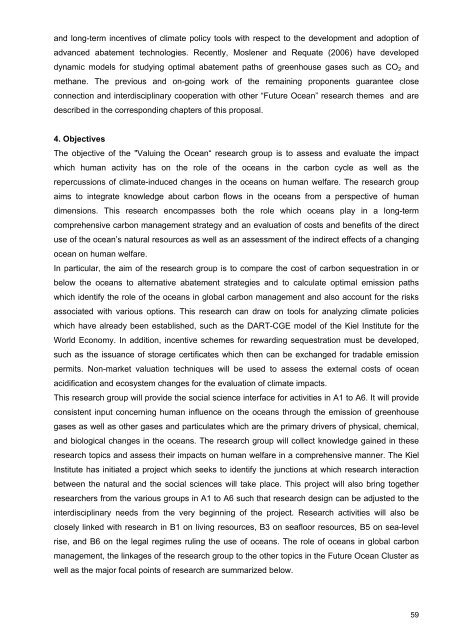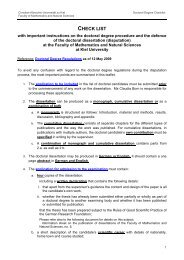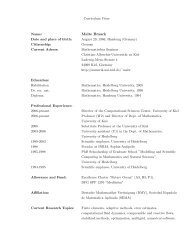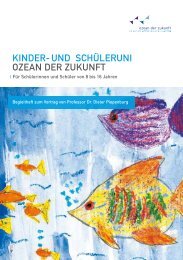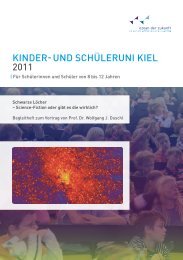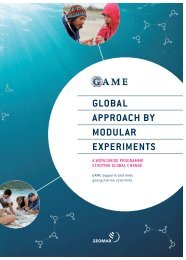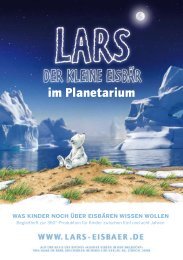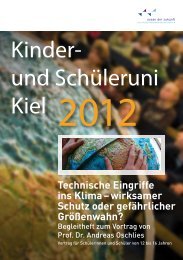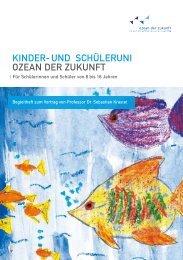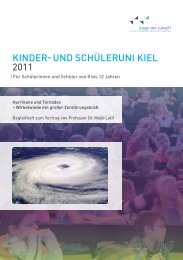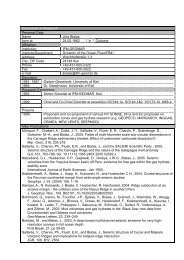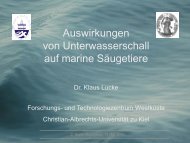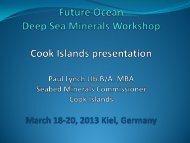Untitled - The Future Ocean
Untitled - The Future Ocean
Untitled - The Future Ocean
- No tags were found...
You also want an ePaper? Increase the reach of your titles
YUMPU automatically turns print PDFs into web optimized ePapers that Google loves.
and long-term incentives of climate policy tools with respect to the development and adoption ofadvanced abatement technologies. Recently, Moslener and Requate (2006) have developeddynamic models for studying optimal abatement paths of greenhouse gases such as CO 2 andmethane. <strong>The</strong> previous and on-going work of the remaining proponents guarantee closeconnection and interdisciplinary cooperation with other “<strong>Future</strong> <strong>Ocean</strong>” research themes and aredescribed in the corresponding chapters of this proposal.4. Objectives<strong>The</strong> objective of the "Valuing the <strong>Ocean</strong>“ research group is to assess and evaluate the impactwhich human activity has on the role of the oceans in the carbon cycle as well as therepercussions of climate-induced changes in the oceans on human welfare. <strong>The</strong> research groupaims to integrate knowledge about carbon flows in the oceans from a perspective of humandimensions. This research encompasses both the role which oceans play in a long-termcomprehensive carbon management strategy and an evaluation of costs and benefits of the directuse of the ocean’s natural resources as well as an assessment of the indirect effects of a changingocean on human welfare.In particular, the aim of the research group is to compare the cost of carbon sequestration in orbelow the oceans to alternative abatement strategies and to calculate optimal emission pathswhich identify the role of the oceans in global carbon management and also account for the risksassociated with various options. This research can draw on tools for analyzing climate policieswhich have already been established, such as the DART-CGE model of the Kiel Institute for theWorld Economy. In addition, incentive schemes for rewarding sequestration must be developed,such as the issuance of storage certificates which then can be exchanged for tradable emissionpermits. Non-market valuation techniques will be used to assess the external costs of oceanacidification and ecosystem changes for the evaluation of climate impacts.This research group will provide the social science interface for activities in A1 to A6. It will provideconsistent input concerning human influence on the oceans through the emission of greenhousegases as well as other gases and particulates which are the primary drivers of physical, chemical,and biological changes in the oceans. <strong>The</strong> research group will collect knowledge gained in theseresearch topics and assess their impacts on human welfare in a comprehensive manner. <strong>The</strong> KielInstitute has initiated a project which seeks to identify the junctions at which research interactionbetween the natural and the social sciences will take place. This project will also bring togetherresearchers from the various groups in A1 to A6 such that research design can be adjusted to theinterdisciplinary needs from the very beginning of the project. Research activities will also beclosely linked with research in B1 on living resources, B3 on seafloor resources, B5 on sea-levelrise, and B6 on the legal regimes ruling the use of oceans. <strong>The</strong> role of oceans in global carbonmanagement, the linkages of the research group to the other topics in the <strong>Future</strong> <strong>Ocean</strong> Cluster aswell as the major focal points of research are summarized below.59


